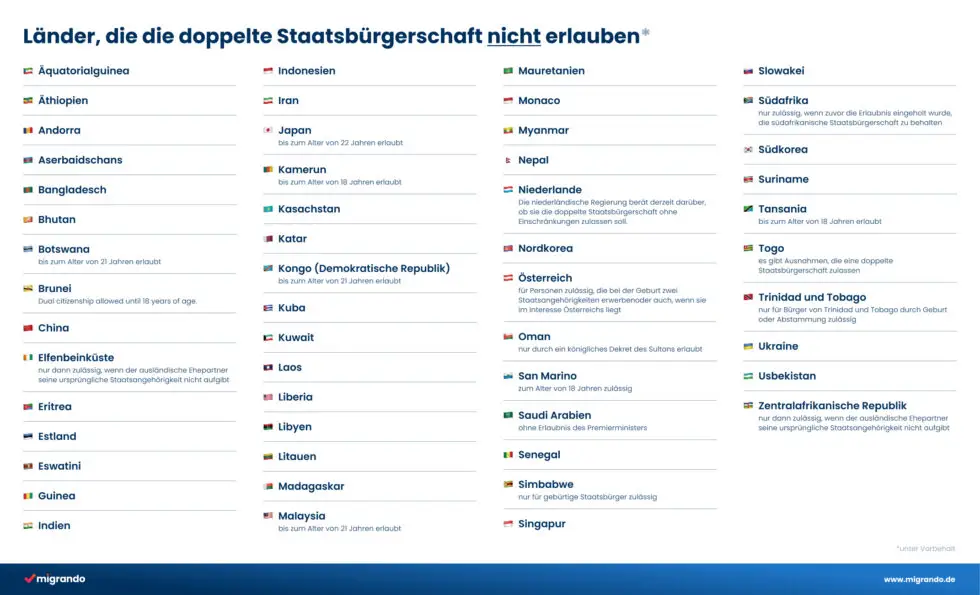What is dual citizenship?
Dual citizenship 2024 allows you to hold citizenship of two different countries at the same time. This legal concept offers you numerous advantages, but can also pose some challenges. In principle, more than 2 citizenships are possible in Germany. There is no specified limit in German law regarding the number of citizenships.Definition and meaning
Dual citizenship means that you have the legal rights and obligations of two countries. This includes the right to vote, access to social services and the obligation to pay taxes in both countries. In Germany, the new naturalization law The possibility of multiple citizenship was introduced on June 27, 2024. However, it is important that you check with the relevant embassies in your country of origin to make sure that dual citizenship is also permitted there.Advantages of dual citizenship
Having two passports can offer significant advantages for you. These include the ability to live and work in both countries, unrestricted access to education and healthcare, and the ability to purchase property in both countries. In addition, as a dual citizen you can benefit from visa facilitation and extended travel freedoms. Another important advantage is the opportunity to exercise political rights in both countries, such as the right to vote and the chance to be elected to public office.Legal situation regarding dual citizenship 2024
The new Naturalization Act, which came into force on 27 June 2024, aims to simplify and modernize the Naturalization in Germany. This law, known as the Act on the Modernization of Citizenship Law (StARModG), brings several important changes that offer you the opportunity to apply for dual citizenship.
Introduction of the new naturalization law
The new Naturalization Act was already planned and implemented by the federal government in 2023. The law, which came into force on June 27, 2024, was intended to make Naturalization more accessible to many people. Here are the main changes brought about by the new law:
- Abolition of Section 10 (4) StAG: You no longer have to give up your previous citizenship in order to obtain German citizenship. However, the decisive factor is whether or not your country of origin legally recognizes dual citizenship in 2024 like Germany. The previous exception under Section 12 StAG has also been removed and is no longer necessary
- Naturalization after 5 years: The naturalization period has been shortened from 8 to 5 years. This means that you can apply for naturalization after just five years of legal residence in Germany.
- Faster Naturalization with special integration achievements: With a C1 certificate and special integration achievements, Naturalization is possible after just 3 years.
- Easier conditions for the guest worker generation: Members of the guest worker generation benefit from simplified conditions for language certificates for German citizenship and are exempt from the naturalization test.
Effects on naturalization processes
These changes have a significant impact on the naturalization process and offer you many advantages:
- Facilitating dual citizenship: Since the previous citizenship no longer has to be renounced, the process becomes less burdensome and complex.
- Shorter waiting times: The reduction of naturalization periods enables you to integrate more quickly and participate in all rights and obligations as a German citizen.
- Simplified requirements for guest workers: The requirements for the guest worker generation in particular have been significantly reduced, making access to citizenship easier.
We have attached a table of the changes for you:
Amendment | So far | New |
|---|---|---|
Surrender of previous nationality | Required | No longer required |
Length of stay | 8 years | 5 years |
Naturalization with integration services | after 6 years | With C1 certificate and special integration achievements after 6 years |
Requirements for guest workers | Naturalization test, language certificate | No naturalization test, simplified language certificates |

Countries that allow dual citizenship in 2024
With the introduction of the new naturalization law in Germany, dual citizenship is now also permitted in this country. Many other countries around the world have similar regulations that allow their citizens to hold several citizenships at the same time.
European countries
Germany
- In Germany, dual citizenship was officially permitted in 2024 with the new Naturalization Act, which came into force on 27 June 2024.
- Previously, for example, Turkish nationals and other affected persons had to give up their previous nationality or apply for a retention permit. These requirements no longer apply.
Italy
- Dual citizenship has been permitted in Italy since the reform of nationality law in 1992. This means that Italian citizens can acquire an additional citizenship without any restrictions.
North American countries
USA
- In the USA, dual citizenship is permitted under the Immigration and Nationality Act of 1952.
- There is no legal prohibition on Americans holding another citizenship, which allows U.S. citizens to hold multiple passports with ease.
Canada
- Canada has allowed dual citizenship since the Citizenship Act of 1976.
- Canadian citizens can thus acquire an additional citizenship without having to give up their Canadian citizenship.
Countries in Asia
Syria
- Syria allows dual citizenship in 2024, but the country considers dual nationals primarily as Syrian nationals, which means that in many situations they are treated primarily as Syrians.
Philippines
- The Philippines has allowed multiple nationality since the introduction of Republic Act No. 9225 in 2003.
- If you swear an oath of allegiance, you can reacquire Philippine citizenship despite having previously renounced it.
Countries in Africa
Nigeria
- Nigeria, like the majority of all African states, generally allows dual citizenship for citizens born in Nigeria and of Nigerian origin in the 1967 Citizenship Act 2024.
Morocco
- In Morocco, dual citizenship is permitted from birth.
- Prior to the introduction of the new naturalization law in Germany, however, the option obligation applied, whereby you had to decide at the age of 21 whether you wanted to retain your Moroccan citizenship or not.
Other countries
Turkey
- Turkey allows dual citizenship under Article 44 of the Turkish Citizenship Law (Madde 44).
- If you acquire another citizenship, you must inform the authorities, who will then record the dual citizenship in the civil family register.
Argentina
- In Argentina, dual citizenship is generally permitted under the Ley de Ciudadanía. Argentine citizens can acquire an additional nationality without having to give up their Argentine nationality.
Brazil
- Brazil also allows dual citizenship with its Citizenship Law No. 818 of September 18, 1949.
- Until now, however, Brazilians had to apply for a retention option in order to keep their Brazilian citizenship, just like US citizens. This requirement no longer applies with the introduction of the new law in Germany.
We have attached a chart showing all the countries that will allow dual citizenship in 2024:

Countries that will not allow dual citizenship in 2024
In many countries around the world, dual citizenship is still not permitted. These countries have strict regulations that either prohibit dual citizenship completely or only allow it under very limited conditions. Below you will find an overview of countries that do not allow dual citizenship.
European countries
Austria
- Austria is one of the countries with the strictest regulations regarding dual citizenship.
- The legal basis is the 1963 Convention, which provides for the prevention of dual citizenship. In Austria, it is therefore generally not permitted to hold two citizenships at the same time.
Netherlands
- The Netherlands also has very strict regulations on dual citizenship, which are also based on the 1963 agreement.
- Dual citizenship is only permitted if one parent is not a Dutch citizen. Otherwise, dual citizenship is generally not permitted in the Netherlands.
Asian countries
Japan
- Japan does not recognize dual citizenship. Citizens who have dual citizenship must choose a nationality by the age of 22.
- This ban was confirmed by Japan's Supreme Court in October 2023, meaning that the strict regulation remains in place.
China
- In China, dual citizenship is not permitted under the 1980 Citizenship Law.
- Chinese citizens must choose between Chinese and another nationality. Simultaneous citizenship is not recognized.
Saudi Arabia
- Saudi Arabia strictly prohibits dual citizenship under the Kingdom's Citizenship Law.
- Holding a second nationality can be considered a criminal offense and has correspondingly severe consequences.
India
- India does not recognize dual citizenship.
- Under the Indian Citizenship Act , an Indian citizen automatically loses his or her Indian citizenship if he or she becomes a citizen of another country.
African countries
Eritrea
- Eritrea does not recognize dual citizenship in accordance with the National Proclamation of 1992 and makes it a punishable offence. The possession of two citizenships is not permitted in the country.
Ethiopia
- In Ethiopia, the acquisition of another nationality means the loss of Ethiopian citizenship. The National Law of 1930 does not recognize dual citizenship.
Senegal
- In Senegal, dual citizenship is not legally recognized under the Code de la Nationalite Senegalaise of 1961.
- Every Senegalese must apply for a retention option if they wish to obtain dual citizenship.
- It is also crucial that the other state allows multiple citizenship. Although a law to this effect has been in force since 2013, dual citizenship is not recognized by law.
Here we have created a graphic overview of the countries that do not allow dual citizenship:
Applying for dual citizenship in 2024
Applying for dual citizenship can be a complex process that involves various steps and requirements. It is important that you prepare well and submit all the necessary documents in order to submit the application successfully. Here you will find an overview of the requirements, a step-by-step guide and possible challenges.
Prerequisites and requirements
In order to apply for dual citizenship in Germany, you must fulfill certain requirements. These vary depending on the country, but often include the following points:
- Legal residence: You must be legally resident in the country and have resided there for at least 5 years.
- Proof of language skills: Proof of sufficient language skills is often required. B1 certificate for the Naturalization after 5 years, C1 certificate for the Naturalization after 3 years. Exceptions apply for the guest worker generation.
- Proof of integration: Proof of integration is the naturalization test.
- Proof of previous nationality: You must provide proof of your current nationality and possibly prove that you wish to retain it.
- Proof of means of subsistence: You must prove that you can support yourself and your family without state support.
- Signed declaration of loyalty: You must sign the declaration of loyalty form in accordance with Section 10 (1) sentence 1a StAG and declare your commitment to the free democratic basic order of the Federal Republic of Germany.
Step-by-step guide to dual citizenship 2024
To make the process of applying for dual citizenship easier, you will find detailed step-by-step instructions here:
Step 1: Preparation of the necessary documents:
- National passport and birth certificate
- Proof of legal residence (e.g. Residence permit)
- Language certificates
- Proof of integration (naturalization test)
- Proof of means of subsistence
- Receipt Signature Declaration of loyalty and commitment to the free democratic basic order.
Step 2: Submitting the application:
- Make sure that all required documents are complete.
- Submit the application to the competent authority.
- Ask for confirmation that you have submitted the application (confirmation of receipt).
Step 3: Waiting for the decision:
- Once the application has been submitted, the waiting period begins. The naturalization authority will now examine your application.
- During this time, you may be able to submit additional information or documents.
- The processing time varies depending on the federal state and individual situation.
- If there is no response from Foreigners' office after 12 weeks, you can file an Lawsuit for failure of act against the authority at the administrative court.
Step 4: Naturalization is successful
- You will receive notification from the naturalization authority that you will be naturalized.
- The naturalization authority will arrange an appointment with you to award the naturalization certificate.
- You will receive a certificate at the award ceremony.
- You apply for your documents (German national passport and German identity card) at the relevant registration office.
Common challenges and solutions
Various challenges can arise when applying for dual citizenship. Here are some common problems and solutions:
Incomplete documents:
- Solution: Check in advance exactly which documents are required and prepare them carefully.
Language barriers:
- Solution: Take part in language courses at an early stage and, if necessary, take language tests to provide the necessary proof.
Long processing times:
- Solution: Make sure your application is complete to avoid delays and stay in regular contact with the competent authority.
Complex legal requirements:
- Solution: Consult a specialist lawyer or advice center to ensure that you meet all legal requirements and to get support during the application process.
Legal and practical tips
Applying for and obtaining dual citizenship can raise a variety of legal and practical issues. Here are some valuable tips that can help you make the process go smoothly and overcome potential challenges.
Advice from lawyers
It can be very helpful to seek advice from a lawyer who specializes in nationality law. A lawyer can help you with this:
- Gain legal clarity: A lawyer can explain the specific legal requirements and regulations that apply in your case.
- Prepare documents: You will receive support in compiling and preparing all the necessary documents.
- Application procedure: A lawyer can guide you through the entire application process and ensure that everything is submitted correctly and on time.
- Solving problems: If legal problems or complications arise, a lawyer can offer suitable solutions and recommendations for action.
Contacting embassies and consulates
The embassies and consulates of your country of origin and residence are important points of contact in the dual citizenship process. Here are some steps to effectively utilize these resources:
- Obtain information: Ask the embassy or consulate about the specific requirements and processes for dual citizenship.
- Confirm documents: Have important documents notarized or legalized if this is necessary.
- Support with applications: Use the advisory services of the embassies and consulates to ensure that your application is correct and complete.
- Clarify questions: Ask all open questions directly to the official bodies to avoid misunderstandings.
Important deadlines and time limits
When applying for dual citizenship, it is crucial to keep an eye on all deadlines and time limits. Here are some important points:
- Application deadlines: Find out about the specific deadlines for submitting your application in your country of residence.
- Validity of documents: Make sure that all your documents are up-to-date and valid. Many documents have a limited period of validity.
- Renewal deadlines: Some documents or proofs may need to be renewed or updated within a certain period of time.
- Decision deadlines: Make sure you are aware of the average processing time and plan accordingly.
Naturalization with dual citizenship?
Conclusion and outlook for dual citizenship in 2024
The possibility of dual citizenship offers numerous advantages and for many people is an important step towards integration and full participation in the rights and obligations of two countries. In 2024, significant progress has been made in many countries, including Germany, in terms of recognizing and facilitating dual citizenship.
Key findings on dual citizenship in 2024
- Relief in Germany: The new naturalization law in Germany now makes it easier to obtain dual citizenship without having to give up your previous citizenship.
- Global perspective: Many countries around the world, including the USA, Canada, Italy and the Philippines, recognize dual citizenship in 2024 and allow their citizens to benefit from the advantages of multiple nationalities.
- Strict regulations: However, there are also countries that continue to have strict regulations against dual citizenship in 2024, such as Austria, Japan and China.
Future prospects and possible legislative changes
- Further development of laws: It is to be expected that other countries will modernize and adapt their laws on dual citizenship in order to do justice to global migration movements and increasing international networking.
- Facilitation in sight: In many countries, future legislative changes could further ease the conditions for dual citizenship and create additional opportunities for people who are rooted in several countries.
- Integration and participation: The recognition of dual citizenship contributes significantly to integration and full participation in society and could be further strengthened and promoted in the future.
FAQ - The most frequently asked questions about dual citizenship 2024
Countries such as Germany, the USA, Canada, Italy, the Philippines and Turkey allow dual citizenship.
In 2024, Germany, the USA, Canada, Italy, the Philippines and Turkey, among others, will be allowed to have dual citizenship.
In Germany, people can have dual citizenship if they are naturalized under the new Naturalization Act, which came into force on 27 June 2024. This applies in particular if they wish to retain their previous citizenship.
The law on dual citizenship in Germany came into force on June 27, 2024.
To apply for dual citizenship, you must submit an application to the relevant Foreigners' office and provide all the necessary documents to Naturalization in accordance with § 10 StAG. It may also be helpful to seek advice from a lawyer.
Dual citizenship is generally permitted in Germany, but there are exceptions. As a rule, dual citizenship is not possible with countries that do not recognize dual citizenship themselves or have strict regulations against it.
Examples of such countries are:
- China: The Chinese Citizenship Law of 1980 does not allow dual citizenship.
- Japan: Japan requires people up to the age of 22 to choose a nationality.
- India: Indian citizens automatically lose their citizenship if they accept another one.
- Saudi Arabia: The Saudi nationality law prohibits dual nationality and considers it a criminal offense.
- Austria: Austria only allows dual citizenship in very limited exceptional cases.
- Netherlands: The Netherlands only allows dual citizenship if one parent is not a Dutch citizen.
- Eritrea: Eritrea bans dual citizenship and makes it a punishable offense.
- Ethiopia: The National Law of 1930 provides for the loss of Ethiopian nationality if another nationality is accepted.
- Senegal: Dual citizenship is not recognized by law, but there are options for retaining it.













